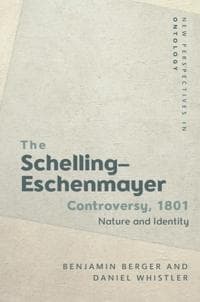
The Schelling-Eschenmayer Controversy, 1801
345 kr
345 kr
Tidligere laveste pris:
348 kr
Ma., 30 juni - to., 3 juli
Sikker betaling
14 dagers åpent kjøp
Selges og leveres av
AdlibrisProduktbeskrivelse
Artikkel nr.
de5f33c1-9525-4eb2-95dc-d4eabacad022
The Schelling-Eschenmayer Controversy, 1801
345 kr
345 kr
Tidligere laveste pris:
348 kr
Ma., 30 juni - to., 3 juli
Sikker betaling
14 dagers åpent kjøp
Selges og leveres av
AdlibrisLignende toppselgere

Øreputer for Bose QuietComfort - QC35/QC25/QC15/AE2 Hodetelefoner Svart
99 kr

INF TYPE-C Dual SD/TF-kortleser for rask dataoverføring 0
99 kr
Tidligere laveste pris:
107 kr

INF Støydempende og lydisolerende ørepropper med krok
114 kr
Tidligere laveste pris:
143 kr

Boland 04224, Latekshette, Voksen, Alle kjønn, Silikagel, Naturlig, 63 g
224 kr

3-Pak - Fidget Spinners med Sugekopp for Barn
119 kr
Tidligere laveste pris:
139 kr

2-Pak - Lader for iPhone - Hurtiglader - Adapter + Kabel 20W USB-C
199 kr

Luftrenseenhet - Renser / Saniterer luften - 20,000 mg/h
599 kr

6x60ml = 360ml - Kirkland Extra Strength 5% Men Hair Regrowth 60ml Hair Loss
1 390 kr

Sony | Playstation® 5 Slim (Digital-versjon) - Spillekonsoll - 1TB SSD NVme - Wi-Fi/LAN - Hvid
5 687 kr

2-i-1 elektrisk barbermaskin for kvinner, våt og tørr, smertefri med LED-display
208 kr
Anbefalinger til dig

INF Digital vekt for smykker / gull / kaffe 0,01 g - 200 g
126 kr
Tidligere laveste pris:
168 kr

Playstation 5 DualSense Controller Midnight Black
799 kr

iPhone Snabbladdare USB-C PD 3.0. 20W Strömadapter + Kabel
147 kr

Universallader for Garmin klokker Svart
89 kr

Hundetrimmer / Potetrimmer - Trimmer for Poter
199 kr

Malibu Fast Tanning Bronzing Butter with Beta Carotene 300ml
179 kr

INF Tilbehør Xiaomi Roborock S5 Max/S50/S51/S55/S5/S60/S65/S6/S6 Pure/S6 MAXV 22 deler
281 kr
Tidligere laveste pris:
351 kr

10x Premium hjørnebeskyttelse og kantbeskyttelse for barn
119 kr
Tidligere laveste pris:
146 kr

Trådløs CarPlay-adapter 2025
379 kr
Tidligere laveste pris:
449 kr

Praktisk minnekortleser med Lightning-grensesnitt
179 kr